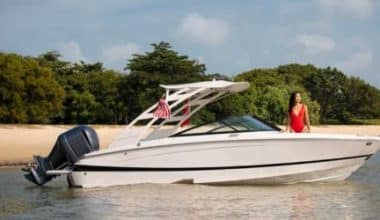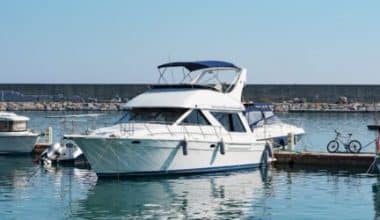Owning a boat requires you to have boat insurance. Most people think about how much boat insurance costs when they are looking for coverage in Texas and Florida. Unfortunately, boat insurance rates are very different depending on many factors, so your actual monthly payment may be different from what was estimated.
How Much Is Boat Insurance?
The purpose of boat insurance is to protect you financially if your boat is damaged, stolen, or involved in an accident. It can also provide liability coverage if someone is injured while on your boat
Insurance costs will typically increase in proportion to the value of your boat. You can save money on your insurance premiums by choosing a policy that provides only limited liability coverage as opposed to full coverage. Boat insurance premiums typically run between $200 and $500 annually. but for a yacht or sailboat, the cost can be as much as 1 to 5 percent of the vessel’s value. Insuring a yacht worth $100,000 might cost you about $2,500 annually. This number is, however, an approximation based on the most typical boat types. The premiums can be much cheaper than $100 a year or much more than several thousand.
Boat prices are highly variable because of factors such as model, size, manufacturer, options, and geographical location. It is more expensive to buy a brand-new boat, but you can save money by purchasing a used one. The cost of owning a boat includes things like upkeep, fuel, protection, dock space, and repairs.
How Much is Boat Insurance per Month?
To safeguard against loss due to accidents, damage, or legal claims, boat insurance is a must. Insurance premiums for watercraft can range widely depending on variables like its make and model, its value, your geographic location, your level of boating expertise, and the types of coverage you select.
About 1.5% of a boat’s annual value goes towards its premiums. For comparison, the annual premium on a yacht worth $200,000 could be closer to $3,000, while the premium on a boat worth $20,000 would be around $300. The typical annual premium for a boat is $245 to $652 ($20 to $54 a month), but this can vary widely from one location to another. However, the cost of insurance may vary from one vessel to another.
Boat Insurance Cost Factors
The many variables used to establish insurance rates explain why premiums can range so widely. When they decide how much to charge you for coverage, companies look at information about you, your boat, and the things you do on it.
#1. Type of Boat
Getting marine insurance depends on a lot of things, including the type of boat you want to cover. Usually, bigger and more expensive boats have higher insurance rates. Higher horsepower powerboats typically have higher insurance premiums. The most common boats to insure are as follows:
- Bass boats
- Bowriders
- Cruisers
- Dinghies
- Fishing boats
- Jet boats
- Personal watercraft (PWC) such as Jet Skis
- Pontoon boats
- Powerboats/speedboats
- Sailboats
- Yachts
- Kayaks
- Canoes
#2. Boat Condition
Your boat’s condition is a factor in determining your insurance premium. The reason is, that vessels in better condition fetch a higher purchase price on the secondary market. It is also more likely that a boat in poor condition will sustain additional damage.
#3. Deductible
The deductible you will have to pay before your insurance kicks in to cover damages is usually up to you to decide. It is the same with car insurance: lowering your deductible means paying a higher premium.
#4. Cruise Zone
The location in which you plan to use your boat is a factor in determining your premium. You can expect to pay more if you plan to travel a greater distance. Furthermore, insurance companies put various levels of risk in various areas. A higher rate might apply if you want to sail in places where storms happen more often.
#5. Storage Location
The location of your boat storage facility will also affect your monthly costs. Your premiums are likely to be higher if you keep your vessel in a location prone to natural disasters like floods, tornadoes, or hurricanes.
#6. Experience with Boats
A lot of insurance companies base premiums in part on the amount of experience a boater has. Those who have been boat owners for a while may be eligible for a discount on their boat insurance premiums. In most cases, older boat owners can get better rates than their younger counterparts.
#7. Lay-Up Period
In many areas of the country, there are times of the year when people cannot or do not use their boats. The term “lay-up period” refers to this time frame, and if you declare one that is sufficiently long, some insurers will offer discounted rates. Any damage to your boat that happens during this time will not be covered, though.
Boat Insurance Discounts
Discounts are an easy way to save on the cost of boat insurance. Not every provider offers the same discount opportunities, but these are the most common:
- Multi-policy Discount
- Multi-boat Discount
- Boat safety course
- Paying full premium
- Claims-free discount
- Responsible driver discount
- Being part of certain Associations
- Use of diesel fuel discount
Boat Insurance Coverage
Boat insurance policies are as diverse as the types of boats available. Policies range from liability-only plans to meet state or marina requirements to high-limit, all-inclusive plans with a wide variety of optional extras. Standard boat insurance coverage is comparable to car insurance coverage:
- Property damage liability: If you cause an accident and are found at fault, property damage liability will pay for repairs or replacements to the other boaters’ and their property.
- Bodily injury liability coverage: If you cause a boating accident and others sustain injuries, your bodily injury liability coverage will pay for their medical bills, lost wages, and other costs.
- Collision insurance: This pays for your boat repairs no matter who is at fault in an accident.
- Comprehensive insurance: Boats are protected from unforeseen perils like fire, theft, vandalism, and even weather with the help of comprehensive insurance.
- Medical Payment: In the event of an accident that falls under your policy’s coverage, we will cover your reasonable medical costs.
- Uninsured boater coverage: Property and injury costs that result from an at-fault boater’s lack of insurance are covered by “uninsured boater coverage.”
Exclusions to Boat Coverage
- Wear and tear
- Deterioration
- Marring
- Denting
- Damage from animals
- Manufacturing defects
- Corrosion
- Mold
- Servicing and maintenance
- Renovations
- Freezing
Boating mishaps that occur outside the policy’s defined cruising area or during a lay-up period may also not be covered.
How To Save on the Cost of Boat Insurance
You can not do much about age or location, two of the biggest factors in how much boat insurance costs. However, if you want to find the least expensive insurance, there are some steps you can take.
#1. Assess Your Need for Boat Insurance
The majority of the time, it is smart to get as much insurance as you can afford. To reduce costs, you can purchase only the minimum amount of boat insurance coverage required by law. You can reduce your premium by decreasing your cruising area and eliminating any unnecessary extras.
#2. Increase Your Deductible
For most insurance companies, as your deductible rises, your premiums drop. Increasing your deductible is one strategy for reducing the overall cost of boat insurance.
However, if you raise your deductible and then have a covered accident, you will be responsible for paying a larger portion of the cost out of pocket. It is impossible to file a claim if you cannot afford the deductible. It is important to assess your financial situation before opting for a higher deductible.
#3. Look For Discounts
If you shop around, you should be able to find a boat insurance provider that offers discounts to help you cut costs. Combining multiple discounts can often result in even greater savings. Most insurance companies publish their discounts online, but there may be others. Be sure to consult your insurance agent about available discounts before committing to a policy.
#4. Establish a Lay-Up Period
A lay-up period may qualify you for a price reduction from some boat insurance providers. Telling your insurance company about a “lay-up period” where you will not use your boat for a long time every year, like the winter, could lower your rates.
#5. Enroll in a Boating Safety Class
Most insurance companies will give you a discount if you enroll in a boating safety course that has received state approval.
#6. Shop Around
Comparing insurance quotes is a great way to save money, whether you are looking for car insurance or another type of policy.
Obtaining an insurance quote online is a service that many companies now offer. Some of the others might require a phone call. In either case, doing some research and comparing prices from various providers can result in significant savings on boat insurance.
#7. Set up Protective Measures
Installing safety and security equipment on your boat may also qualify you for a discount from some providers. Onboard fire suppression systems, often in the form of fire extinguishers, are a standard safety feature.
Discounts on boat insurance are often available to boat owners who can demonstrate that they have carried essential safety gear such as life vests, life rafts, fire extinguishers, EPIRBs, and visual and audible signaling devices.
#8. Claim only Significant Losses
It may be worthwhile to pay for minor damages yourself rather than submit a claim to your insurance company. Your insurer may increase your premium after you file a claim, but in the long run, this could work out to your benefit.
#9. Just Get the Protection You Need
Think about your boating habits to make sure you are not paying for unnecessary insurance coverage. If you put your boat away for the winter, for instance, you might not need insurance coverage during that time. Explore the possibility of getting a lower rate if you only use your boat on lakes and streams.
Actual Cash Value vs. Agreed Value
Most boat insurers provide two policy options: actual cash value and agreed value. They may sound the same, but if a boating accident causes a total loss, the distinction can be crucial.
When you file a claim under an actual cash value policy, your insurer will give you the money equivalent to what your boat was worth at the time of the accident. This is different from an agreed-value policy, which only pays out a set amount set by your insurance company when you start the policy.
With an agreed-upon value policy, you will not have to worry about your possessions depreciating over time. That is why agreed-value policies for boats are more expensive than actual cash-value ones.
How Much Is Boat Insurance in Florida?
Florida is a boater’s dream destination. Florida is known as the Sunshine State because it has more coastline than any other US state. Unfortunately, there are drawbacks to this seemingly perfect environment. The risks and hazards of boating in Florida necessitate a comprehensive insurance policy to safeguard you and your watercraft.
When compared to the rest of the United States, Florida has significantly higher rates of both boat theft and severe weather. Furthermore, the potential for year-round boating increases the time spent on the water, which in turn raises the risk of accidents.
Boat insurance premiums in Florida can cost anywhere from $100 to $700 annually. How much your boat insurance costs depends on a lot of things, like the type of boat you have, how often you go boating, how much coverage you need, and how much the boat is worth.
The state where you live will affect these rates. Overall, the cost of an annual policy will be about $263 in states with low rates and up to $527 in states with high rates. Insurance companies may charge you more if you own a more expensive boat or if your personal information is riskier than average.
Costs associated with boat insurance are generally higher in coastal states due to the larger and more expensive boats that are common there. In addition, people are more likely to have accidents on the water because they can use their boats more frequently due to the warmer climate.
Florida has some of the highest boat insurance rates in the country. The price of boat insurance in Florida can vary widely depending on several factors, including the make, age, and size of your vessel. However, the average cost of boat insurance in Florida ranges from $200 to $1,000 annually.
How Much Is Boat Insurance in Texas?
It is difficult to estimate the price of a policy without more information because of the wide variety of variables that affect the price of insurance. However, annual premiums for private boat insurance in Texas typically range from $600 to $1200, with the state of Texas having the highest average premiums at $348.
Whether you opt for liability, collision, and/or comprehensive coverage will determine the base premium for your boat policy. The total cost of your policy will rise if you opt for supplemental insurance. Annual boat insurance premiums typically cost between $600 and $1000.
In general, Progressive boat insurance premiums in Texas are among the highest in the country. However, annual premiums for private boat insurance typically range from $600 to $1200, with the state of Texas having the highest average premiums at $348.
Boat insurance premiums change with factors like where you live, how big your boat is, how fast it goes, and more. Your annual fee per customer could be between $300 and $500.
The Annuity Expert estimates that yearly boat insurance in Texas costs an average of $348. However, this estimate is just an estimate and actual costs may vary. Furthermore, in Texas, full-coverage boat insurance can cost as much as $1,500 per month. This variety reflects the wide variety of boats, boat values, boating habits, and insurance preferences among Texans.
How to Calculate Boat Insurance?
As a general rule, boat insurance covers about 1.5 percent of the boat’s value per year. Most boats cost between $250 and $500 annually to insure, with yachts and other expensive watercraft costing between 1% and 5% of their value.
Why Is Boat Insurance So Cheap?
States further inland, away from the coast, tend to have more affordable boat insurance premiums. The smaller size of boats and shorter duration of boating seasons in Great Lakes states result in lower insurance premiums.
Is Boat Insurance a Good Idea?
Maintaining your insurance, especially full coverage, is wise. Insurance will protect your boat from loss due to theft, hail, and other covered perils while it is in storage. You should still get insurance for your boat, even if you own it full-time. Being insured for your boat can protect you from many risks, including damage, theft, and accidents.
How Much Can You Use to Insure a 100K Boat?
If you own a motorboat with a value of $100,000, you should budget approximately $1,500 for its annual insurance premium.
What Is Basic Marine Insurance?
Ships, cargo, and terminals, as well as the means of transportation used to acquire, transport, and store the property, are all protected by marine insurance. Marine insurance protects against the financial loss associated with the loss or damage of goods while they are in transit, both on land and at sea.
Does Boat Insurance Cover Sinking?
The majority of boat insurance policies do cover sinking, but there are a few key exceptions you should be aware of. If your boat sinks due to an insured peril, your insurer should pay for the repairs and possibly the cost of salvaging it.
Do You Need Insurance on an Old Boat?
Protecting your boat and your financial stability with boat insurance is a must, especially for older boats. If you take the time to educate yourself on the dangers of boating with an older vessel and find a good insurance policy, you can relax and enjoy your time on the water without worry. You may require a more specific insurance plan if your boat is considered antique or classic. Classic vessels often have unusual features and might need specialized insurance.
Insurance companies are less likely to cover older boats because they may need parts that are not available anymore and may need more frequent maintenance.
How Much Does It Cost to Winterize a Boat?
A big part of owning a boat is getting it ready for winter. It helps keep the boat safe from the elements during the winter and makes sure it is ready to go once the weather warms up again. A standard winterization package will typically cost between $200 and $1,000. Typically, you can expect to pay between $300 and $400.
Does Boat Insurance Cover a Blown Motor?
If the engine failure was not the result of your failure to perform routine maintenance or inspections, your boat insurance may pay for the repairs. Typically, insurance will cover damage to an engine resulting from an accident or severe weather. however, if your engine fails because of regular use or carelessness, your boat policy will not cover it.
Conclusion
Boat insurance typically costs between $500 and $1000 annually. Given the wide variety of factors at play, however, your actual premiums may be significantly different. The best way to determine how much money you should set aside for boat insurance is to request a quote.
Several factors can affect how much you pay for boat insurance in Texas. Know these details and shop around for quotes to find the best policy for your boating excursions. If you take the time to tailor your insurance policy to your specific needs in terms of boat type, value, usage, and experience level, you can cruise the thriving waters of Texas with peace of mind.
- THE BEST CAR INSURANCE IN NEW YORK FOR 2023
- BASIC LIFE INSURANCE: What Is It & How Does It Work?
- HOW TO SAVE MONEY CAR INSURANCE: Proven Tips & Steps
- BEST PET INSURANCE IN MASSACHUSETTS (MA) 2023
- BUSINESS PERSONAL PROPERTY INSURANCE: What Is It & Who Needs It?






